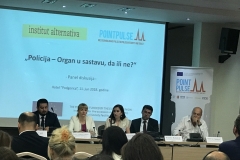Current Draft Law on State Administration removes obligations of the state administration towards the Parliament, thus limiting its control function; the Draft is not harmonised with a number of other regulations.
In our comments provided during the public discussion, we warned of the inconsistency of the proposed solutions with Rules of Procedure of the Parliament of Montenegro.
 While the Rules of Procedure prescribe that MPs are entitled to access all relevant official materials, documents and data that are prepared or collected in the committees or the Service of the Parliament, the Government, ministries and other state administration bodies, the Draft Law proposes that ministries submit requested records and documents to the Parliament only within the framework of parliamentary investigation.
While the Rules of Procedure prescribe that MPs are entitled to access all relevant official materials, documents and data that are prepared or collected in the committees or the Service of the Parliament, the Government, ministries and other state administration bodies, the Draft Law proposes that ministries submit requested records and documents to the Parliament only within the framework of parliamentary investigation.
By reducing availability of information and documents on the work of ministries that can be submitted to the MPs for review, the scope of the Parliament`s control function is reduced. Hence, we propose the current MPs’ rights to be additionally prescribed by the new Law on State Administration, by specifying the obligation of the ministers and heads of state authorities to provide the necessary information to the MPs, in accordance with the Parliament act.
Although it is commendable that this Draft Law introduces for the first time an explicit obligation to publish a consolidated version of the regulation, in one part it limits the scope of information that authorities have to proactively publish pursuant to the Law on Free Access to Information.
Namely, in addition to consolidated versions of regulation, the Draft obliges state administration bodies to publish strategies, work programs, work reports and other strategic documents, organigrams and contact data of management personnel, and information on services i.e. a link to information on services. The Law on Free Access to Information, on the other hand, obliges all authorities to publish twelve information items, including employee lists and public payroll information.
For this reason, we have suggested that, due to the competence of the Agency for Personal Data Protection and Free Access to Information to inspect the proactive disclosure of information, the obligation to publish the final consolidated versions of regulation should be further defined by a special law on free access to information and adequate sanctions should be prescribed if the state administration bodies do not abide by these obligations.
Tendency to make state administration bodies obliged to provide information on services is also positive, and it could be an introduction to making the catalogue of services that Institute Alternative advocates for. However, the Draft relativizes this tendency by the possibility of publishing only a link to the eUprava portal. Leaving such alternatives is not good, especially since all services need not be converted into electronic format.
Our proposal is to explicitly prescribe the obligation to make, publish and update the catalogue of all services provided by a state administration body, regardless of whether they are available in electronic or other format.
We also consider that the Law on State Administration should set deadlines for providing feedback to citizens who address state administration bodies. It is also necessary to establish the obligation of the body to forward received request to a competent body and inform applicants about it, within shorter deadline, when not competent.
Institute Alternative Team
You can download our proposals for the Draft Law on State Administration here.





 Having established the Council for Rule of Law as a parallel structure to the Working Groups for Chapters 23 and 24, which serve completely the same purpose, in February 2018, the Government of Montenegro adopted the Dynamic Plan of Work on Interim and Closing Benchmarks in EU-Montenegro Negotiating Chapters [1].
Having established the Council for Rule of Law as a parallel structure to the Working Groups for Chapters 23 and 24, which serve completely the same purpose, in February 2018, the Government of Montenegro adopted the Dynamic Plan of Work on Interim and Closing Benchmarks in EU-Montenegro Negotiating Chapters [1].